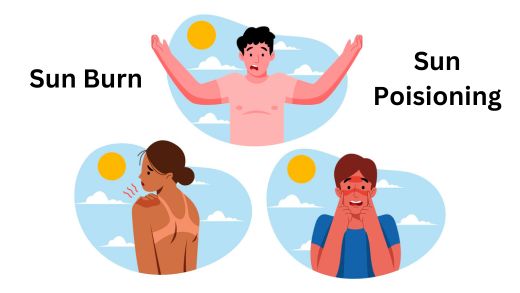- May 29, 2023
- Posted by: design7seo
- Category: Blog

Spending time under the sun can be enjoyable and beneficial, but it’s crucial to protect your skin from harmful UV rays. Unfortunately, even with precautions, sunburns can occur. In some cases, a severe sunburn can lead to sun poisoning, a more severe condition that requires medical attention. So, how can you differentiate between a bad sunburn and sun poisoning? In this blog, we’ll explore the signs and symptoms of both and provide guidance on when to seek medical help.
Sunburn: The Basics
A sunburn occurs when the skin is exposed to excessive UV radiation from the sun or tanning beds. It typically appears as red, painful, and swollen skin, often accompanied by heat and tenderness. Mild sunburns can be treated with home remedies, such as applying aloevera gel, taking cool showers, and using over-the-counter pain relievers.
Sun Poisoning: When Sunburn Goes Awry
Sun poisoning, on the other hand, is a more severe form of sunburn. It typically happens when the skin has been exposed to intense UV radiation for an extended period or when the person is particularly sensitive to the sun. Here are some key signs that you may be experiencing sun poisoning:
- Severe Pain: Sun poisoning often causes more intense and widespread pain compared to a regular sunburn. The affected area may feel tender to the touch and may throb or pulse.
- Blistering: While blisters can occur in both sunburns and sun poisoning, they are more common in severe cases of sun poisoning. The blisters can be large, filled with fluid, and cause discomfort.
- Swelling: Sun poisoning can cause significant swelling in the affected area. The swelling may be more pronounced compared to a regular sunburn.
- Fever and Chills: Unlike a regular sunburn, sun poisoning can trigger systemic symptoms such as fever, chills, headache, nausea, and dizziness. These symptoms may indicate that the sunburn has become more severe and requires medical attention.
- Dehydration: Sun poisoning can lead to dehydration due to excessive fluid loss from the damaged skin. Signs of dehydration include extreme thirst, dry mouth, fatigue, and decreased urine output.
- Skin Rash: In some cases, sun poisoning can cause a widespread rash that extends beyond the sun-exposed areas. This rash may be accompanied by itching, hives, or other allergic reactions.
When to Seek Medical Help
While most sunburns can be treated at home, it’s crucial to know when to seek medical help for sun poisoning. Consider the following scenarios:
- Severe Symptoms: If you experience severe pain, blistering, swelling, fever, chills, or dehydration, it’s important to consult a healthcare professional. These symptoms may indicate sun poisoning and require medical attention.
- Large Blisters: If your blisters are large, cover a significant portion of your skin, or show signs of infection (redness, pus, increased pain), seek medical help.
- Systemic Symptoms: If you experience symptoms beyond the skin, such as severe headache, vomiting, confusion, or rapid heartbeat, seek immediate medical attention, as these may indicate a severe reaction to sun exposure.
- Pre-existing Conditions: Individuals with pre-existing medical conditions, such as immune disorders or medication sensitivities, should consult a healthcare professional to ensure proper management of sunburn or sun poisoning.
Prevention is Key
Preventing sunburn and sun poisoning is crucial for maintaining healthy skin. Remember to take the following precautions:
- Use Sunscreen: Apply a broad-spectrum sunscreen with an SPF of 30 or higher, and reapply every two hours or after swimming or sweating.
- Seek Shade: Limit your time in direct sunlight, especially during peak hours when the sun’s rays are the strongest (usually between 10 a.m. and 4 p.m.).
- Wear Protective Clothing: Cover your skin with lightweight, long-sleeved shirts, pants, and wide-brimmed hats.
- Use Sunglasses: Protect your eyes from UV radiation by wearing sunglasses that block 100% of UVA and UVB rays.
- Stay Hydrated: Drink plenty of water to stay hydrated, especially when spending time outdoors.
Conclusion: Distinguishing between a bad sunburn and sun poisoning can be challenging, but recognizing the signs and symptoms is essential for proper treatment. If you experience severe pain, blistering, swelling, systemic symptoms, or have pre-existing conditions, seek medical help. Remember, prevention is key—take the necessary precautions to protect your skin from the sun’s harmful rays and enjoy the outdoors safely.

